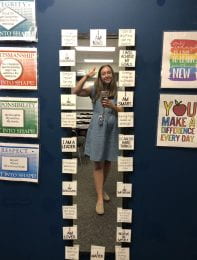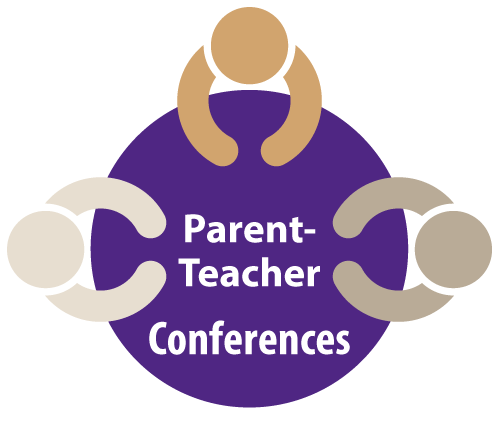Lori Goodson, Editor
Amanda B. Causey, Technical Editor
Author: lagoodson
In the Classroom: AnnMarie Riley

Name: AnnMarie Riley
Location: USD 383 Manhattan/Ogden Woodrow Wilson Elementary
Class/content area taught: Third grade
What are you most excited about with your new career? I have been wanting to be a teacher since I was little, so now my dream has come true! I am excited about building relationships with students and being in person with them. I student taught for the USD383 remote school last year which was all virtual.
What you enjoy most about teaching: I enjoy building relationships with students. I also enjoy seeing the “lightbulb” moments for students when they make connections and epiphanies.

What are some specific things you believe KSU especially helped prepare you for your new career? KSU prepared me very well with planning lessons and being knowledgeable about the KSDE standards. My professors had applicable lessons that truly translate to the classroom. Also, having experiences in the classroom starting early also helped me get comfortable in the school setting.
Suggestions/encouragement for new teachers: 1) Start planning early and over plan because some lessons might go shorter than anticipated. 2) Ask any question that you have. No one will judge you for it. 3) Ask for help because the other teachers want to help you succeed. 4) Self-Care: Take some time to take care of yourself when things get overwhelming. 5) Stay organized! 6)Build relationships with the teachers and other faculty at the school!
Bonus question, thanks to the Pandemic: COVID-19—How has the Pandemic shaped your classroom—the environment, safety precautions, etc.? How has it affected you as a new teacher? We currently have to wear masks and make sure desks are 3 feet apart. We also make sure to sanitize often. Lunch times and recess times are separated by grade level. This has affected my classroom set up because I cannot group desks together. This makes having students work in groups or discuss with the person next to them a little more difficult.
Instagram: Learn_with_Miss_Riley

Extra duties means extra possibilities for connections
 Outside your classroom, you’ll find that you’re asked, or possibly required, to take on other duties around your school. Some of the more common tasks: bus duty (before and/or after school), gym supervision (before and/or after school), lunch supervision, and recess. Plus there are all the club sponsorships available at the various grade levels.
Outside your classroom, you’ll find that you’re asked, or possibly required, to take on other duties around your school. Some of the more common tasks: bus duty (before and/or after school), gym supervision (before and/or after school), lunch supervision, and recess. Plus there are all the club sponsorships available at the various grade levels.
Before you say no—or at least grumble a little about it—look at the opportunities these extra duties provide.
At the middle level, you might find yourself supervising bus duty; that can give you a chance to hang around the elementary students as they leap off the last step on the bus, headed home after a busy day. You may end up tying a very small shoe now and then or helping adjust a tiny mitten in the wintertime, but you’ll also flash back to your own elementary school days…and remember just where your own students came from not so many years ago.
At the elementary level, you may get to see some of your students bounce into their parents’ arms at the end of the school day—bubbling about what they did in your class today.
At the high school, the bubbling may be minimal, but you’ll be in a more relaxed atmosphere as your students climb into their cars and head out for the day.
Lunch duty can provide an opportunity for you to mingle with the student body—some students you may not even have in class. It’ll give you a chance to visit with them—about food, interests, and…yes…even school-related matters.
All of these opportunities can be powerful relationship builders for you and your students, especially when you’re a new teacher trying to make connections and get comfortable in the environment.
Make the most of them.
Meeting the parents: Make it a positive experience
 Even the most veteran of teachers can find Parent/Teacher conferences a little uncomfortable, but being prepared will help you make the most of this important opportunity. So let’s get prepared by considering the following:
Even the most veteran of teachers can find Parent/Teacher conferences a little uncomfortable, but being prepared will help you make the most of this important opportunity. So let’s get prepared by considering the following:
BEFORE THE CONFERENCES
- Have meaningful grades in your grade book so you can talk about the child’s progress.
- Take time to get to know each student so you can demonstrate at the conference that you’ve made a personal connection with the student.
- Learn as much as possible about the process for parent/teacher conferences. Some schools require that the student take an active part in the discussion, so make sure your students are prepared, as well.
- Compile (or have your students compile) folders of their work to share with their parents/guardians. Include writings, assignments, assessments, and artwork to showcase their learning so far this year. You may want to add other items, such as grades, assessment results, and other items to share, as well.
- Find out what materials and information teachers traditionally share at the conferences, since it can vary greatly from school to school and district to district.
- Know the details of the conferences—when, where, guides on how much time to spend with each student’s parent/guardian, when to suggest an individual meeting to have more extensive discussions, etc.
- Prepare a flier with important upcoming dates, a list of needed classroom items if they would like to contribute, and a brief look at upcoming important dates to help them be involved in their student’s education.
AT THE CONFERENCES
- Step No. 1: Smile and introduce yourself.
- Realize that the parents/guardians are taking time from their busy schedule to visit with the child’s teachers. Since we encourage family involvement in their child’s education, we need to appreciate their efforts. Be sure to thank them for attending.
- Make comments about concerns and accomplishments specific to that student.
- Provide specific ideas on areas where you’d like to see the student improve; provide specific suggestions on how the parent/guardian can help make that happen.
- Be prepared to answer if a parent or guardian asks when he or she can do to help. That’s a golden opportunity you don’t want to overlook. Many times parents want to help, but they’re unsure just how to do that.
- Make sure they know you value their input; provide additional contact information, and encourage them to contact you with any concerns or ideas.
- Keep track of which students have individuals attending the conference on their behalf. Many schools provide a sign-in sheet; if not, consider creating a roster so you’re aware of who attended and who didn’t.
- Review the list and consider making a personal effort to get parents/guardians of students you’re especially concerned about to set up an individual appointment with you.
- Following the conferences, briefly thank your students for having their parents/guardians attend the conferences. However, don’t overdo this; in many cases, the students can’t help it if the adults in their lives decline the opportunity to attend the conferences.
Be ready for a substitute
 In your first few weeks of teaching, you’ve probably not even thought of the possibility that you might miss a day of teaching. However, the time will come—due to your being sick or an illness in the family, an emergency, or even a professional development opportunity supported by your school—that you will be absent from your classroom for a day or more.
In your first few weeks of teaching, you’ve probably not even thought of the possibility that you might miss a day of teaching. However, the time will come—due to your being sick or an illness in the family, an emergency, or even a professional development opportunity supported by your school—that you will be absent from your classroom for a day or more.
It’s better to be prepared for it, rather than wait for that opportunity to present itself—possibly as stomach flu at 4 in the morning.
Some schools have folders that their teachers use for substitute plans, or possibly a sheet that includes the basic information of your teaching duties. But you’ll want to be a little more prepared than that, so you’ll probably want to set up your own Substitute Plans folder and keep in your desk in a specific place.
Consider adding the following to your personal “sub” folder:
- Your daily schedule (including times, lunch and plan periods, etc.)
- Lists (and directions) of any other rooms where your substitute would need to be.
- General school daily schedule (hours/blocks/etc.).
- General school lunch schedule.
- Emergency drill plans (map, directions, etc.)
- A list of key contacts and their telephone extension numbers.
- Easy access to class rosters (with notes of any special needs or concerns for specific students).
- Seating charts, if applicable.
- A brief sentence summarizing the purpose of the class.
- A list of information about each class—approximate number of students, any paraprofessionals or other educators who assist with the class.
- For classes with older students, a list of responsible, go-to students they can count on for help.
- Your phone number or email if they should need to contact you.
- Blank notebook pages—so they can easily leave you notes about the classes and any concerns or updates that they’d like to share.
- A list of where they can find key materials.
- Some untimely—but educationally appropriate—assignments that the substitute can use to fill time, as needed.
By having this general information already prepared, when the time comes for you to be absent, you’ll only need to write the specific activities for that day.
For those daily activities, if your absence is unplanned due to an illness or emergency, email the specific directions to the office assistant and to another teacher, as a backup. Be sure to point out the location of your substitute folder. Otherwise, have a copy printed out ahead of time and left on your desk.
The easier you can make it for the substitute, the easier your return will be…and the less worrying you’ll do during your absence. Trust me, the stomach flu…or the PD opportunity…will demand ALL of your attention!
We want to hear from you!
What’s up?
Why don’t you send us a photo of you at work in your classroom! Or, do you have a question about classroom procedures? A suggestion for a topic we should address in Before the Bell? Want to add your name to our mailing list? Or provide a different email for our list? At the very least, just email and say hi! We’d love to hear from you!
Early-career teachers, feel free to jump in and offer suggestions to those who are following your career choice!
We’d love to hear from you, so please email us at lagoodson@k-state.edu.
Go, COE Cats!
Procedures add to your effectiveness
You’ve heard it before, but after a month of teaching, you might want a quick reminder. Here are a few ideas on why procedures can help you have a more effective classroom so you can get to the task of teaching, rather than disciplining. There’s plenty on the Internet about this, but here are a couple of favorites that make some key points for whatever grade level you’re teaching:
Just ahead
Lori Goodson, Editor
Welcome to the 2021-22 school year!
 Welcome to your new school year! This is an amazing time–in a lot of different ways, and we are excited to continue with you on this journey!
Welcome to your new school year! This is an amazing time–in a lot of different ways, and we are excited to continue with you on this journey!
We realize it’s an especially interesting time–not just for your career, but also as we continue to navigate COVID-19 issues in the classroom. But we know you’re ready for it!
You’ve worked a long time to get to this point in your career, and you’re not going to let these concerns keep you from doing what you love–and what you’ve trained for over the past several years.
For many of you, 2021-22 is your first school year as a teacher, and that makes this August just a little more significant than all those others that have come before it. For others, you might be beginning your second year with your own classroom—wanting to build upon what you accomplished last year…and maybe avoid a few of those bumps you experienced. How do I know about the bumps? Well, we’re a little hesitant to admit to it, but we’ve all been there. Every teacher experiences those through the year. (And each year we work to get better. We’re still a work in progress.)
And we also want you to know Kansas State University’s College of Education is here to help. This newsletter is designed to give you specific and practical tips to help you successfully navigate through your early years of teaching. Look for topics that address the various issues as the school year moves along—from setting up your classroom to preparing for conferences with parents to wrapping up the room for the summer. Likewise, we’re hoping to remind you early-career teachers of a few things and provide some new ideas, as well, to help you continue to be successful. (OK, so my first year of teaching, I dismissed a class at the 5-minute warning bell and had to round a giggling group of eighth graders back up! It happens!)
We’ll also include some information about new programs we’re putting into place—just for new teachers. Dean Debbie Mercer has made it a priority to help you out as much as possible, so look for several opportunities where we can lend our support. And if you’re not seeing what you need, just email me…lagoodson@k-state.edu…and we’ll do our very best to address your specific concerns and questions. Even if you don’t have questions or concerns, I’d love to hear from you!
We hope you’ll enjoy our ideas and suggestions and keep in touch with us as you move through lesson plans, lunch counts, and assessments. It’s our way of reminding you that you’re not alone…and that the COE is here to support you in any way possible.
Whether it’s your first year or beyond, you’ve begun an amazing journey. The great thing about teaching is that every August your journey begins again, only you’ll have more practical wisdom to make it even more successful! Thanks for letting us be a part of it! Stay purple!
